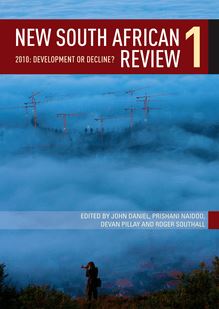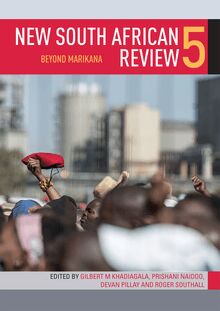New South African Review 3 , livre ebook
235
pages
English
Ebooks
2013
Vous pourrez modifier la taille du texte de cet ouvrage
Obtenez un accès à la bibliothèque pour le consulter en ligne En savoir plus
Découvre YouScribe en t'inscrivant gratuitement
Découvre YouScribe en t'inscrivant gratuitement
235
pages
English
Ebooks
2013
Vous pourrez modifier la taille du texte de cet ouvrage
Obtenez un accès à la bibliothèque pour le consulter en ligne En savoir plus
Publié par
Date de parution
01 mars 2013
Nombre de lectures
1
EAN13
9781868147953
Langue
English
Introduction: The second phase – tragedy or farce? - Devan Pillay
Introduction to Part One: Party, power and class -John Daniel
Chapter 1 The power elite in democratic South Africa: Race and class in a fractured society - Roger Southall
Chapter 2 The ANC circa 2012-13: Colossus in decline? - Susan Booysen
Chapter 3 Fragile multi-class alliances compared: Some unlikely parallels between the National Party and the African National Congress - Paul Maylam
Chapter 4 Predicaments of post-apartheid social movement politics: The Anti-Privatisation Forum in Johannesburg
Ahmed Veriava and Prishani Naidoo
Introduction to Part Two: Ecology, economy and labour - Devan Pillay
Chapter 5 Mass unemployment and the low-wage regime in South Africa - Dick Forslund
Chapter 6 Nationalisation and the mines - Martin Nicol
Chapter 7 Broad-based BEE? HCI’s empowerment model and the syndicalist tradition - William Atwell
Chapter 8 ‘Ask for a camel when you expect to get a goat’: Contentious politics and the climate justice movement - Jacklyn Cock
Chapter 9 Hydraulic fracturing in South Africa: Correcting the democratic deficits - David Fig
Introduction to Part Three: Public policy and social practice - Prishani Naidoo
Chapter 10 Understanding the persistence of low levels of skills in South Africa - Stephanie Allais
Chapter 11 Equity, quality and access in South African education: A work still very much in progress - Shireen Motala
Chapter 12 Health sector reforms and policy implementation in South Africa: A paradox?
Laetitia Rispel and Julia Moorman
Chapter 13 Cadre deployment versus merit? Reviewing politicisation in the public service - Vinothan Naidoo
Chapter 14 Traditional male initiation: Culture and the Constitution - Louise Vincent
Introduction to Part 4: South Africa at large - Roger Southall
Chapter 15 South Africa and the BRIC: Punching above its weight? - Sanusha Naidu
Chapter 16 The Swazi Nation, the Swazi government and the South African connection - John Daniel and Marisha Ramdeen
Publié par
Date de parution
01 mars 2013
Nombre de lectures
1
EAN13
9781868147953
Langue
English
NEW SOUTH AFRICAN REVIEW 3
THE SECOND PHASE – TRAGEDY OR FARCE?
EDITED BY JOHN DANIEL, PRISHANI NAIDOO, DEVAN PILLAY AND ROGER SOUTHALL
Published in South Africa by:
Wits University Press
1 Jan Smuts Avenue
Johannesburg
www.witspress.co.za
Published edition © Wits University Press 2013
Compilation © Edition editors 2013
Chapters © Individual contributors 2013
First published 2013
ISBN 978-1-86814-735-9 (print)
ISBN 978-1-86814-795-3 (digital)
All rights reserved. No part of this publication may be reproduced, stored in a retrieval system, or transmitted in any form or by any means, electronic, mechanical, photocopying, recording or otherwise, without the written permission of the publisher, except in accordance with the provisions of the Copyright Act, Act 98 of 1978.
Cover image: Thousands of striking mine workers demanding a wage increase demonstrate on 16 August 2012 on a hill near Lonmin’s Karee Platinum Mine.
Photo by Gallo Images/ City Press /Leon Sadiki
Project managed by Monica Seeber
Cover design and layout by Hothouse South Africa
Maps by Monica Seeber
Printed and bound by Paarl Media, Paarl
Contents Contents v Preface ix INTRODUCTION The second phase – tragedy or farce? 1 PART 1: PARTY, POWER AND CLASS INTRODUCTION Party, power and class 12 CHAPTER 1 The power elite in democratic South Africa: Race and class in a fractured society 17 CHAPTER 2 The ANC circa 2012-13: Colossus in decline? 39 CHAPTER 3 Fragile multi-class alliances compared: Some unlikely parallels between the National Party and the African National Congress 61 CHAPTER 4 Predicaments of post-apartheid social movement politics: The Anti-Privatisation Forum in Johannesburg 76 PART 2: ECOLOGY, ECONOMY AND LABOUR INTRODUCTION Ecology, economy and labour 92 CHAPTER 5 Mass unemployment and the low-wage regime in South Africa 95 CHAPTER 6 Nationalisation and the mines 119 CHAPTER 7 Broad-based BEE? HCI’s empowerment model and the syndicalist tradition 138 CHAPTER 8 ‘Ask for a camel when you expect to get a goat’: Contentious politics and the climate justice movement 154 CHAPTER 9 Hydraulic fracturing in South Africa: Correcting the democratic deficits 173 PART 3: PUBLIC POLICY AND SOCIAL PRACTICE INTRODUCTION Public policy and social practice 196 CHAPTER 10 Understanding the persistence of low levels of skills in South Africa 201 CHAPTER 11 Equity, quality and access in South African education: A work still very much in progress 221 CHAPTER 12 Health sector reforms and policy implementation in South Africa: A paradox? 239 CHAPTER 13 Cadre deployment versus merit? Reviewing politicisation in the public service 261 CHAPTER 14 Traditional male initiation: Culture and the Constitution 278 PART 4: SOUTH AFRICA AT LARGE INTRODUCTION South Africa at large 294 CHAPTER 15 South Africa and the BRIC: Punching above its weight? 297 CHAPTER 16 The Swazi Nation, the Swazi government and the South African connection 314 Contributors 333 Index 334
Preface
This third edition of the New South African Review indicates that our series of volumes featuring original chapters on issues of concern and interest to South Africa is coming of age, and is an established feature of the annual calendar (although for publishing reasons a new schedule will see it appearing in the first quarter of the year rather than the last). As ever, our chapters seek to present critical and progressive, yet varying, perspectives on current affairs, to encourage debate and diversity rather than conformity. Inevitably, for reasons of economy and practicality, there are numerous topics that we ignore or omit, and it may appear to some that our choice of issues is somewhat random, for although we as editors aim to discern common concerns raised by our contributors, we do not impose a theme upon them. We welcome suggestions of important issues, national or local, for inclusion in later volumes.
The New South African Review continues to be located in the Department of Sociology at the University of the Witwatersrand, Johannesburg, with John Daniel of the School of International Training in Durban having served as an additional editor of this and the two preceding volumes. We should like to thank the University for its financial support for the project under its SPARC Programme, and Professor Tawana Kupe, who served his final year as Dean of Humanities during 2012, for his constant support. Our colleagues in the Department of Sociology provide constant backing, while Ingrid Chunilall and Laura Bloem, our administrators, willingly undertake the numerous backroom tasks necessitated by production of the volume. Once again, we have received the enthusiastic support of Veronica Klipp and all her staff at Wits University Press, while Monica Seeber has exhibited her usual proficiency, combined with her kindly ability to harry recalcitrant contributors to stick to schedule. Finally, alongside our referees who unfailingly provide valuable and constructive comments, we thank all those who have reviewed our previous volumes and who have given us the encouragement to continue with this project on an annual basis.
John Daniel (School of International Training, Durban) and Prishani Naidoo, Devan Pillay and Roger Southall (all of the Department of Sociology, University of the Witwatersrand).
Introduction
The Second Phase – tragedy or farce?
Devan Pillay
Hegel remarks somewhere that all great world-historic facts and personages appear, so to speak, twice. He forgot to add: the first time as tragedy, the second time as farce …
( Karl Marx 1852 )
The Marikana massacre of 16 August 2012 epitomised, in many ways, the tragedy of South Africa’s transition to democracy since the heady days of 1994. If, on the one hand, the country is hailed as a ‘miracle’ of reconciliation, constitutional democracy and socioeconomic progress in many areas, on the other hand it is a story of a dream deferred: rising unemployment and work insecurity; widespread poverty amid expanding inequality; increasing crime and corruption; sexual violence; rural decline and displacement; urban homelessness and slummification; state dysfunctionality and public disservice; corporate greed and ecological degradation of various kinds.
Much of this corresponds with the global picture of uneven (or enclave) development, and is captured by chapters in this volume and previous volumes of the New South African Review, as well as by the state’s own National Planning Commission , which presents the social deficit as a problem of policy formulation and implementation. Marikana, however, exposes the scenario as a problem of global capitalism that still shows up in South Africa in a racialised form, embedded in a minerals-energy-financial complex based on cheap labour power – the hallmark of apartheid. Despite the coming to power of a democratically elected government supposedly representing the interests of the majority, Marikana has shown how, in the final instance, the state apparatus acts on behalf of a ‘power elite’, with the aid of subordinate classes beholden to its network of patronage, and with the aid of the mainstream media. 1
The manner in which the African National Congress (ANC) and its Alliance partners responded – closing ranks around the tainted president Jacob Zuma – under the guise of a ‘second phase’ of the ‘national democratic revolution’ to supposedly address persisting historical imbalances, raises the question: has the tragedy of Zuma’s first term, which patently failed to address the essential features of the so-called ‘1996 class project’ 2 (namely, neoliberal, enclave development), now become a farce?
MARIKANA: THE TRAGEDY OF RACIAL CAPITALISM
Marikana is about the sociology of the triple transition ( Von Holdt 2003 ): the intertwined transitions, to political democracy and elite pact-making; to globalised economic liberalisation; as well as a much more complex set of social transitions in the wide range of social spaces that constitute daily life, including the workplace, as ordinary people try to reconstruct a new order amid the still burning embers of a racialised capitalist past and present.
In other words, it is about the sociology of transnational corporations, investor confidence, mineral extraction, global production and consumption processes, private motor cars, ecological hazards, the repatriation of profits, high management salaries, black economic enrichment, low wages, hazardous working conditions, migrant labour, impoverished rural areas, fatherless households, informal settlements, municipal neglect, state indifference, cosy corporatism, union oligarchy, rival unions, worker self-organisation, working-class solidarity, cultural weapons, strike violence, police militarisation, state violence, political opportunism, alliance politics, media bias … it is the story of post-apartheid South Africa, distilled to its essence.
The savage power of the dominant class revealed itself in all its ugly nakedness on 16 August, as thirty-four striking mineworkers were mowed down by a police force acting on the instructions of the economic and political elite. As Roger Southall’s chapter shows, the power elite may be fractured along racial lines and through various differentiated interests at the economic and political levels, and as such may not come across as a coherent ‘ruling class’. Indeed, at the political level legitimacy is constructed through alliances that carry the dead weight of past symbolism and allegiances, keeping in power a liberation movement that has long ceased to be revolutionary. To remain alive this alliance needs to breathe the oxygen of the ‘national democratic revolution’ ideological discourse that seemingly excludes an economic elite that still resembles the old order. However, when faced with a determined challenge from below, the power elite sees, crystallised before it, its own true class interest. If, previously, the cacophony of petty squabbles struck discordant note





